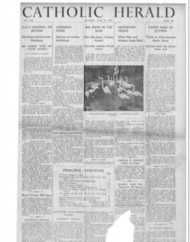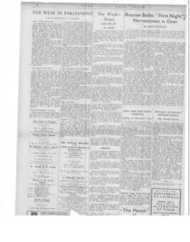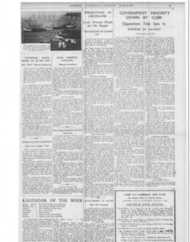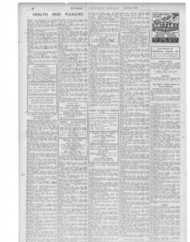Page 16, 29th June 1935
Page 16

Page 17

Report an error
Noticed an error on this page?If you've noticed an error in this article please click here to report it.
Tags
Share
Related articles
Waugh's " Campion " And Campion Hall
Two For The Price Of One
Cardinals' Records Set Straight Forever
Continuing
All Sorts
A Study of Blessed Edmund Campion
I Beginning with the present issue the " Catholic Herald " has arranged to print week by week a series of extracts from a brilliant study of Edmund Campion by Evelyn Waugh which is to be published by Longmans, Green and Co., later in the year. The extract given below deali with the first visit of Queen Elizabeth to Oxford University.
Elizabeth's first visit to Oxford had been twice postponed. Two years earlier —in 1564—she had been to Cambridge, where the whole University had exerted itself in her entertainment, some of the more enthusiastic members even following her on the first stage of the return joerney and attempting to make themselves agreeable to her—unsuccessfully, as things wined out—by performing a burlesque of the Mass, in which one of them, dressed as a dog, capered about the stage with a Host in his mouth. She had meant to proceed to Oxford at that time, but the plague. brought over by the defeated garrison from Dieppe, still hung about the city, and it was not until the summer of 1566 that it was thought eafe for the eagerly expected visit to take place. Although it was vacation time, practically the whole university remained in residence for her coming. The court was at the palace of Woodstock, a short journey away, and at the end of August, on an afternoon of heavy rain, Leicester, who was now chancellor of the university, Sir William Cecil and a few companions rode over to make the final arrangements. Two dsiys later—Saturday, 31st—the Queen follpwed them, attended by most of the Court and the Spanish Ambassador. Leicester came to meet her at Wolvescote. the boundary of the university liberties; with him were the vice-chancellor and the heads of houses in their academic robes. It was a formidable afternoon. From the moment that the gay and chattering procession crossed into university ground, the character of their reception becathe manifest. That day, at any rate, there was to be no levity; nor was there to be any haste. The cavalcade halted while the Provost of Oriel pronounced in laboriously polished Latin an address of welcome, which can have been intelligible to very few of the attendant ladies and gentlemen -the Earl of Warwick, Leicester's brother. a tough, middle-aged soldier; Edward de Vere. Earl of Oxford, aged sixteen. Cecil's son-in-law, but a child of the old nobility, soon to get into trouble for murdering a servant; young Edward Manners. Duke of Rutland—all sitting patiently on their horses while the phrases of the oration rose and fell in the best Ciceronian style. At length it came to an end, compliments were exchanged and the procession moved off. A few miles further on another little cluster of notables was assembled—the Mayor of the City and the civic dignitaries. Here the speeches were in English, but at the North Gate another don was in wait for them, Mr. Deal of New College, with an oration in Latin. From the gate to Cartax the way was lined with kneeling and applauding scholars; this was the kind of thelg to which the court was accustomed, but et Carfax came another check, Lawrence. the Regius Professor, with a composition in Greek. It was the finest oration, des Queen said, that she had ever heal d G re2k; shs was prepared for an excherige 01 pleasantries in the same languaee, hut. in pay for the evident distress os Ler followers, she consented to postpone it until they reached their lodgings. I he company moved on again, litter Lind hackney, but the speeches were not yet over Al the gates of Christ Chuich. Mr. Kinesmill, the University Orator. was ready to welcome them. The Queen heard him to the end, but. grown slightly testy by this time. merely remarled in acknowledgment, -You would base done well had you had good matter." The court crossed the threshold of the House: they were now among the very buildings where most of them were to be quartered. but their hosts had not yet done with them. Four doctors in their scarlet robes were observed advancing upon the royal party across the quadrangle. carrying a cimopy; under this Elizabeth was led to church where, in sonorous English, prayers were offered in thanksgiving lot her safe arrival; an anthem was sung to the music of cornets;
efter the anthem there were more prayers. At last, late in the evening. the weary courtiers were allowed to disperse. to see
to their baggage and their beds, to wash and refresh themselves, while the young Queen stole away to her lodgings through the gathering shadow of Dr. Westphaling's garden.
The visit lasted for six days. There were some lighter moments: a Latin play
in Christ Church Hall, called Marcus Geminus, which the Queen did not attend (the Spanish Ambassador spoke so
highly of it that she resolved to lose no
more sport thereafter). an English play acted in two parts named Palemon and Arcs*, at the first night of which the stage collapsed. killing three people and injuring five more: on the second night a
.pack of hounds was introduced into the
quadrangle, which moved the young scholars confined to the upper stories, to such eecitement that the Queen expressed her leer that they would fall out of the .winclues; there were several elaborate dinners: but for the most nart the enter had played their parts, that Edmund Campion made his appearance. He was then twenty-six years old, seven years younger than the Queen, but already a person of outstanding importance in the university. At the age of seventeen he had become a fellow of St. John's, and almost immediately attractesi found him a group of pupils over whom he exerted an effortless and comprehensive influence; they crowded to his lectures, imitated his habits of speech, his mannerisms and his clothes, and were proud to style themselves "Campionists." There had been a certain difficulty in choosing suitable subjects for debate, for the subject in everyone's mind at Oxford and on everyone's tongue was the Queen's change of religion; Cecil had carefully edited the list of propositions, eliminating Jewel's attempt to bring matters to an issue; it was well known that Oxford, and particularly St. John's, was predominantly Catholic in sympathy; the last thing that he wanted was to embarrass the occasion by arousing the theological passions that had flamed into disorder when Peter Martyr had been professor of divinity. Discussion was confined to strictly secular subjects, and to Campion fell the task of proposing "that the tides are caused by the moon's motion," and "that the lower bodies of the universe are regulated by the higher." Throughout his career Campion preserved a naive interest in natural science, and later, in the dark hours when he was fighting for his reputation in Hopton's Hall, he was willing to prove to his judges that the heavens were as hard as crystal. Now he seems to have treated the question at issue as a subordinate matter; all his eloquence, the delicate accent, the terse, stylish antithesis, the strong and accurate diction, that made him the model of the schools, was devoted to the praise of the Queen and the Vice-Chancellor. Speaking in Latin, he began: "One thing only reconciles me to the unequal contest, which I must maintain single-handed against four pugnacious youths; that I am speaking in the name of Philosophy, the princess of letters, before Elizabeth, the lettered princess. He praised the learning of her ancestors and her condescension in visiting her poor scholars; then he turned to the Earl of Leicester, who sat beside her, and reminded him that-it was due to his godly and deathless benefactions that the university had thrown off its lethargy and was once more advancing in hope. "May God preserve these benefits to us; may He preserve," bowing left and right, "your Majesty, your Honour; you our mother, you our protector—te quae hacc faces, te qui haec mones," at which the Queen. Wining smiling in her seat towaids the Earl, said: "You, my lord, must still be one." The balanced compliments succeeded one another, until, remarking that the poor scholars had no fit present to offer their visitors except what was within them, something from "the veins and bowels of philosophy," Campion proceeded to his subject and briefly expounded the theory that the sea was constantly blown out with vapours, like water boiling in a pot. The speech was the success of the afternoon. The Queen warmly applauded and commended Campion to Leicester, and later, when the Spanish Ambassador remarked that, though laudable, the speeches were, after all, well prepared beforehand, and the Queen assembled the most notable orators for an extempore debate at Merton, Campion was among them, and spoke on the subject of "Fire" in a way to confirm her highest opinions of him. Before leaving Oxford, both Cecil and Leicester saw Campion privately, and promised hint their patronage.
He could hardly have been offered two
more different patrons the secretary, purposeful, cautious, self-controlled, indefatigable, middle-class, the man of the desk and the council table; and the flamboyant courtier, swarthy and swaggering, magnificent, impulsive, a spectacular horseman, a soldier; descended on one side from the great families of English history, Talbot and Beauchamp, on the other from the reckless, bloodstained house of Dudley; three generations of
Dudleys, his grandfather, his father and his brother, had died on the scaffold; per haps no one in Oxford doubted that Amy Robsart, whose obsequies four years before they had piously celebrated, had been murdered at his orders. At any hour he
might become the Queen's husband. His was all the glamour of the great world that lay beyond the university liberties; the pageantry and the high politics of the new reign. It was to him that Campion immediately attached himself. And Leicester did not neglect his satellite. At Woodstock and Rycote when
the court felt the need for a serious interlude, it was often Campion who was summoned to minister to them. For, though.
to the dazzled young scholar their world might seem something intangibly remote. those in power knew very well that they had need of men like Campion. There century Erasmus had placed English scholarship above that of France or the Germarues, second only to Italy in its breadth of culture. It was to England that the University of Leipsic had turned for its professor of Greek; Colet, Grocyn, Lynacre and More were able to converse on terms of equality with the leading men of Padua, and under their temperate and profound influence Oxford was emerging gradually, steadily, by a process of
organic growth, from the cloistered formality of the middle ages into the spa cious, luminous world of Catholic humanism. With the Pope's encouragement Wolsey had taken over monastic revenues for the endowment of Christ Church; Fox, Bishop of Winchester, instituted the first Greek lectureship in the foundation of Corpus; the faction of
"Trojans" who were opposed to the new learning were being gently pressed into acquiescence by the King and the bishops. Close correspondence was kept with the great teachers of Italy, and the founda tions were laid of a Renaissance which, illuminated by the poetic genius native to the country, might, in a generation, have been one of the glories of Europe. All this ended abruptly and violently at Henry's break with the Pope. Weren the Church was in undisputed authority she
could afford to wink at a little speculative fancy in her philosophers, a pagan exuberance of taste in her artists; now, when she was driven to defend the basis and essential structure of her faith, there
was no room for indulgence; controversy took first place among the arts, and scholars became famous for their views on the Mass rather than their appreciation of classical poetry.
More than this, the confiscators of ecclesiastical property made havoc of uni
versity finance. Education all over the country was dependent upon monastic and chantry foundations, and at their suppression grammar-school education in many districts came utterly to an end. Here and there the revenues of the dispossessed religious were kept for public services, and a few reorganised grammar schools survived under charters of Edward VI, but in the great majority of cases the estates went direct to the courtiers. At Oxford the colleges were as comparatively new institution, LILA a large part of university life still cenwed in the halls which the various abbeys and priories maintained for their students. These were all emptied; the under,' aduates dependent on monastic exhibitions were turned adrift and the colleges themselves entertained well-founded apprehensions of how long they would be allowed to survive. The courtiers both of Henry VIII and Somerset had pressed for their abolition; the demand, in both cases, was resisted and rebuked, but the thirst for plunder was not slaked and it is possible that, if Edward VI had lived some years longer, both universities would have come to grief. As it was, the visitors of Edward VI suppressed many of the exhibitions for poor students which had survived the acts of confiscation, and only the strenuous protests of the citizens saved Magdalen Grammar School from extinction. The college chapels were ransacked of popish ornaments; the great reredos of All Souls was destroyed, and New College windows only survived on the fellows' promise to have them out as soon as they could afford to replace them with plain glass; but it was upon books that the Protestants particularly turned their disapproval. The whole of the Duke Humphrey's library was gutted and the shelves sold in the streets; the illuminated office books in Magdalen choir were hacked up with choppers, and from every college cartloacla of books were removed to be burned or sold as waste paper; a coloured initial was enough to convict the contents of popery; a mathematical diagram of magic. When the visitors left, the collections of centuries had been irretrievably ruined. Better order was restored under Mary. Two new colleges, St. John's and Trinity, were founded, but the past could not be recalled. There was another upheaval at Elizabeth's succession, and numerous Catholics lost their chairs and fellowships; no one felt confidence in the rewards of scholarship. Politics and theology continued to sway University elections. A great tradition had been broken. Not for a hundred years was the university to know security, and it was to emerge from its troubles provincial, phlegmatic and exclusive; not for three hundred years was it to re-emerge as a centre of national life. Elizabeth and Cecil were well aware of ,these conditions. They had a genuine and deep respect for learning, and one object of the visit had been to assure the scholars of royal favour. In this they were successful, the numbers taking degrees show a marked increase from this time. But thete was another and more delicate mission. From its earliest days the university had been primarily a place for the training of churchmen. By the statutes, holy orders were obligatory on aspirants for almost all the important offices. Sons of the aristocracy might keep term in the interests of culture, but the general assumption for the poor scholars was that they were qualifying as priests. Now Cecil eod Elizabeth were finding it very hard to get suitable candidates for minis, considerable fortune, it has extended his public from two countries to two henaispneres. In return he has given it someming that it lacked, te public after which n strained and never seemed to reach, he has added dignity to its pedestrian progress from artizanry to art_
An Arliss picture may not always be good cinema, but it is always good. There may be ham about the acting, but it is the xery best ham. He may not always satisfy the critics but he does satisfy the public, and the whole public is the Arliss public. His hall-mark stands for something.
It is said, and with a good deal of truth, that Arliss is always Arliss; that Disraeli was Rothschild, that Rothschild was the Working Man, that the Working
an was the Last Gentleman and that the Last Gentleman was George Arliss. I he personality not only obtrudes. it derninates. Arliss is always Mlles, but, and herein surely lies his genius, he always manages to persuade his audience that each character is true, that each inoividual portrayed must have been just eeactly like George Arliss. While he remains himself he persuades you that he Is somebody else, and that, we submit, must be pretty good acting.
Unfortunately, there arc exceptions to every rule or perhaps it is that there are sUille historic characters better known to the general public than others. Twice at least in the Arliss cinematograph career the Arliss character and personality have /Oiled to fit the character portrayed. In 7 he Iron Duke, Arlisp looked like a duke but not like Wellington; in Cardinal 12,r1telien he looks like Richelieu, but not like a cardinal.
Life or Theatre ?
But, even if Richelieu is not a good bit
blog comments powered by Disqus





















